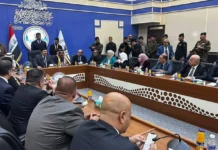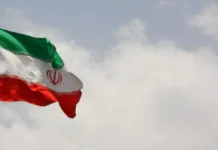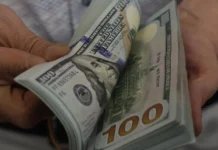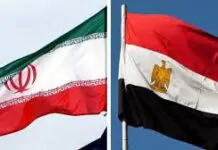Iraq Is Considering Contracting With International Companies Specializing In Oil Monitoring And Packaging.
Time: 2025/09/11 10:25:53 Read: 1,095 times {Economic: Al Furat News} Informed sources within the Ministry of Oil said on Thursday that the ministry is studying a plan to enhance the transparency of oil exports from Basra ports, as part of measures aimed at curbing US pressure on the oil sector.
Last Saturday, Prime Minister Mohammed Shia al-Sudani ordered the formation of a high-level investigative committee to investigate suspicions of Iraqi oil smuggling.
According to sources, “The Ministry of Oil is currently considering contracting with well-known international oil companies specializing in oil auditing, monitoring, and packaging.
The sources emphasized that the framework the ministry is considering in this regard is to provide greater transparency in Iraqi oil export operations abroad.”
Over the past two years, the Prime Minister has implemented a comprehensive and tangible reform package in the country’s energy sector, resulting in significant strides in combating corruption, increasing revenues, expanding oil exploration, and developing gas fields across Iraq. https://alforatnews.iq/news/وزارة-النفط-تدرس-إجراءات-لزيادة-شفافية-صادرات-العراق-النفطية
Experts: Iraq On The Verge Of Self-Sufficiency In Oil Derivatives
Economic 09/11/2025 Morning: Hussein Faleh Over the past two years, Iraq’s oil refining sector has witnessed significant transformations as part of a broader government strategy aimed at achieving energy security, reducing reliance on imports, and achieving self-sufficiency in all petroleum products.
Oil refining capacity has risen to 1.3 million barrels, placing the country among the top Arab countries in this field.
Oil expert Nabil Al-Marsoumi explained in an interview with Al-Sabah that “Iraq’s oil refining capacity currently stands at around 1.3 million barrels per day, but the actual production of petroleum derivatives does not exceed 1 million barrels per day.”
He pointed out that “the development achieved in the refining sector came after the operation of the Karbala refinery, the addition of new units in the northern and Al-Sumoud refineries in Salah al-Din, in addition to the development of the Basra refinery, which contributed to increasing the production of gasoline and gas.”
Decrease in gasoline imports
Al-Marsoumi added “Iraq previously imported about 15 million liters of gasoline per day, while imports have now decreased to about 6 million liters.”
He explained that “the country achieved self-sufficiency in gas in 2024, but will resume importing in 2025 due to the growing demand for this material for use in electricity generation.”
Al-Marsoumi continued, “Iraq may be able to achieve self-sufficiency in gas next year, but it will be difficult to achieve this in gasoline due to the significant increase in consumption rates.”
He pointed out that “the most prominent challenges facing Iraqi refineries are the antiquated nature of their infrastructure, as they still produce about 400,000 to 500,000 barrels per day of fuel oil (black oil), whose value in global markets is lower than the price of crude oil, and its local uses remain limited, causing economic losses.”
Al-Marsoumi stressed “the importance of modernizing Iraqi refineries and establishing modern refineries to produce high-value white derivatives, such as refined gasoline for cars, jet fuel, gas, and oils, which will contribute to maximizing financial returns and providing the national economy with new resources.”
Expanding storage capacity
For his part, oil expert Hamza Al-Jawahri proposed, to advance the refining and petrochemical industries, “expanding the storage capacity of petroleum products and separating it organizationally from extractive industries.”
Al-Jawahri told Al-Sabah: “Expanding storage capacity is essential, as any failure to sell any product could lead to the refinery shutting down, which poses a major challenge that must be addressed.”
He stressed the “need to separate oil manufacturing operations, whether refining or petrochemical industries, from the extractive industry, and perhaps place them within an independent ministry to ensure their optimal development.”
Al-Jawahiri, who added that “Iraq, as a major global producer of crude oil, cannot remain with the same current organizational structure.
Rather, there must be a ministry specializing in the oil industry that includes the fields of refining and petrochemicals, separate from the Ministry of Oil,” stressed that “the human resources available in Iraq represent an important asset, but they are not being properly invested, despite the state spending large sums of money on them.”
He called for “intensive training of Iraqi personnel in the refineries and petrochemical industries sector, in order to qualify them to contribute to the development of the national industry.”
Investing In Human Energies
Al-Jawahiri stressed that “the issue is not limited to increasing refining capacity alone, but rather ncludes optimal investment in human resources and expanding storage capacities, in addition to establishing a private institution to market petroleum products and petrochemical industries, which will enhance the country’s economic capabilities and bring about a major development boom.”
Economic And Strategic Advantages
Crisis management expert Ali Jabbar Al-Furaiji told Al-Sabah that “the operation of the Karbala refinery with a capacity of 140,000 barrels per day, and the addition of advanced production units in the Basra and Baiji refineries, have contributed to raising the total refining capacity from approximately 1.1 million barrels per day in 2024 to approximately 1.3 million barrels per day currently, with a plan to reach 1.65 million barrels per day in the near term.” Al-Furaiji explained that “these transformations achieve a number of gains, the most prominent of which are:
1. Reducing imports and saving hard currency:
Iraq was spending approximately $4.5 billion annually on importing gasoline alone. With the move toward local self-sufficiency by 2025, the import bill will decline significantly, saving billions of dollars and easing pressure on foreign reserves.
2. Enhancing energy security: Geographically distributing refining capacity between Karbala, Basra, and Baiji contributes to reducing operational risks and ensuring stable supplies during crises.
3. Maximizing added value by expanding the production of light derivatives and reducing reliance on their imports, which allows resources to be redirected toward infrastructure and services.
4. Attracting investment and transferring technology:
Through new projects, such as the South Basra/Al-Tuba refinery with a capacity of 200,000 barrels per day, which represents an entry point for investment partnerships and the localization of refining technologies.
Modern.
5. Improving the balance of payments: by increasing exports of surplus fuel oil and some derivatives, thus strengthening the trade balance and supporting financial stability.
Existing challenges
Al-Furaiji pointed out that “the gap still exists between the design capacity of refineries and their actual operating rates, due to supply constraints or maintenance bottlenecks,” noting “the need to integrate refinery projects with gas collection and electricity processing programs to reduce operating costs and enhance sustainability.”
He stressed that “expanding refining capacity is not a temporary boom, but rather a cumulative leap that restructures foreign exchange flows and supports the resilience of the local market,” explaining that
“the direct impact is represented by reducing the import bill by $3-5 billion annually, while
the strategic impact is represented by consolidating the concept of energy self-sufficiency as one of the pillars of sovereignty.” Al-Furaiji concluded his remarks by saying:
“Economic”.
“The success of this strategy is measured by three main factors: operational sustainability through regular maintenance and stable supply, quality outputs that meet international specifications, and rapid replacement of imports to ensure the stability of the currency and the economy.”
The kidney.
Earlier, Prime Minister Mohammed Shia Al-Sudani confirmed that Iraq had raised its refining capacity to (1.3) million barrels per day.
The media office said in a statement,
“Within the framework of the government’s approach to strengthening national sovereignty in the energy sectors and providing petroleum derivatives, on the path to consolidating economic stability and confident national development, Iraq has been able to raise its refining capacity to the level of (1.3) million barrels per day, to become among the Arab countries with the highest capabilities in this field,” noting that “with this growth and expansion in capabilities, we are moving towards achieving a refining capacity of (1.65) million barrels per day.” https://alsabaah.iq/120360-.html
For current and reliable Iraqi news please visit: https://www.bondladyscorner.com






